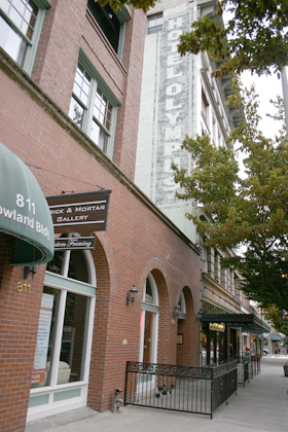For nearly a year, a group of residents and business owners in downtown’s north end have wondered about the future of the Hotel Olympus — a seven-story, 98-year-old residential building that provides 49 apartment units for low-income residents.
Merchants in the adjacent Rowland Building have complained for years that the building is mismanaged, and a magnet for police calls. In July, two of those merchants filed a lawsuit against Hotel Olympus’s owner, alleging that chronic nuisance activities have crippled their abilities to run profitable businesses.
In November 2006, when the Korean Women’s Association (KWA) applied for $1.5 million in state funds to assist with a purchase of the building, the news gave some nearby residents and city leaders hope: perhaps new ownership and management could turn the building around.
But a sale of the building has moved slowly, according to people close to the deal. KWA has yet to receive grant money. And on Sept. 14, KWA executive director Lua Pritchard told the Index that negotiations had “not gone very far” and it was “taking time for both parties to respond.”
Since then, Pritchard has declined to elaborate on specifics of the deal. In an e-mail Sept. 18, Pritchard wrote, “At this point, we do not have anything to share with you. We don’t feel as if we have anything concrete for this project yet.”
On Monday, however, during a meeting of the city council’s neighborhoods and housing committee, Pritchard provided some insight into the deal.
The Hotel Olympus, if purchased by the KWA, would remain as low-income housing with a focus on assisting victims and families affected by domestic violence, according to Pritchard. The building would also include a resident management firm who would oversee security 24-hours per day, and new and existing residents would be subject to “a full inspection and screening assessment.”
“We would have to do it our way, otherwise we won’t do it,” added Pritchard. “We would do all that before we spent a penny.”
Though committee members were happy to hear of KWA’s interest in the building, they also also provided a cautionary history of the area. Tacoma Mayor Bill Baarsma and Councilmember Jake Fey discussed many of the concerns by nearby merchants over management of the building.
Baarsma said he has received e-mails from a business owner who reports cigarette butts, beer cans, and diapers have been thrown out of the Hotel Olympus and onto the roof of an adjacent building. “Some prefer the building be used for other purposes, or managed in a way that doesn’t have an adverse affect on the neighborhood,” said Baarsma. “My sense is that some work needs to be done by your organization to meet with surrounding property owners.”
Councilmember Fey agreed.
“Without question, that block is subject to more e-mails and complaints than any other part of my district,” he said. He added that a number of various uses — a teen nightclub, nearby transit center, growing restaurant and nightlife scene, and a concentration of low-income housing — has made the area near South Ninth and Commerce streets an area with a variety of concerns. “It isn’t the most attractive location for what you are trying to do.”
In July, two merchants — Laura Hanan, who owns the Rowland Building and Brick & Mortar art gallery owner, and Kris Blondin, who owns Vin Grotto wine bar (both located in the Rowland Building) — sued M&M Properties, Inc., the Hotel Olympus’s current owner, over alleged chronic nuisance activity that has made it difficult to operate their businesses.
In their suit, Hanan and Blondin claim the owner has allowed its building and premises to be used in “a dangerous, destructive, unhygienic, noisy, and illegal manner.”
A trial date is set for Jan. 30, 2008 in Pierce County Superior Court.
Pritchard told the council committee she first learned about the suit after reading an article about it in the Index on Sept. 14. Despite the lawsuit, she remained bullish about purchasing the building. She hoped to complete the deal by the end of this year, and said she was confident KWA could improve conditions inside the building.
“We can do a better job,” she said. “When we take over, it will be much better.”










